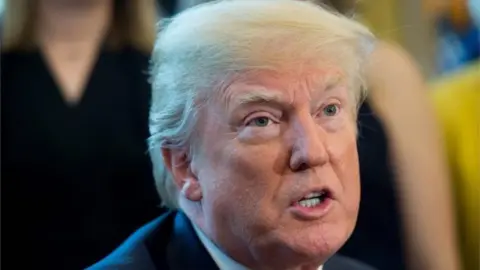What we learn from Mueller's 'Trump questions'
 Getty Images
Getty ImagesA list that reports to be Robert Mueller's proposed questions for Donald Trump is like a walking tour of all the Russia-related controversies surrounding the Trump campaign and the early days of his presidency.
There's the June 2016 Trump Tower meeting between top campaign aides and a woman with ties to the Russia government. And the Ukraine-related changes to the Republican Party platform. And fired national security adviser Michael Flynn's contacts with Russian Ambassador Sergei Kislyak.
More than half the questions obtained by the New York Times are related to possible obstruction of justice by the president or his team.
These include Attorney General Jeff Sessions' recusal from the Russia probe and Mr Trump's reaction to that, the clashes with former FBI Director James Comey up to and including his firing and possible efforts to undermine Mr Mueller's own investigation.
In a series of Tuesday morning tweets the president said it was disgraceful that the questions were made public and claimed that their topics proved there was no "collusion". He focused in particular on the obstruction of justice aspect of the inquiries, writing that "it would seem very hard to obstruct justice for a crime that never happened!"
That kind of argument may play in the court of public opinion, but there's not a lot of legal support for such a view.
Just ask Martha Stewart, who went to jail for obstructing a federal investigation into insider trading, or Scooter Libby, who was convicted of obstructing a special counsel investigation into White House leaks of a covert CIA operative's name. Neither was convicted for the crime they were accused of.
Mr Libby, one might recall, recently received a full pardon from Mr Trump.
Given that the Times says the list came from communications between the special counsel and the Trump legal team, it's entirely possible the leak came from the president's own side.
Michael Zeldin, an assistant to Mr Mueller when he was FBI director, told CNN on Tuesday morning that he thought the wording of the questions made it unlikely that the leak came from the special counsel's office.
"Some of the grammar is not even proper," he said. "I think these are more notes that the White House has taken and then they have expanded upon the conversation to write out these as questions."
And even if the document accurately details the thrust of Mr Mueller's presidential inquiries, there's no indication that the list is complete - or what, if any, follow-up questions the special counsel team might ask if they get their face-to-face meeting with the president.
Despite Mr Trump's insistence, there appears to be plenty of interest in possible collusion.
There are questions about Mr Trump's 2013 beauty pageant visit to Moscow (featured prominently in the now infamous "Steele dossier"), his involvement with any Russian real estate deals during the presidential race, his son-in-law's attempts at back-channel contacts with the Russian government, his former adviser's contacts with Wikileaks and his knowledge of any outreach by campaign aides "to Russia about potential assistance to the campaign".
There's even a question about a 2017 Seychelles meeting between Trump associate Erik Prince and a Russian businessman. There have been reports that Mr Mueller has evidence that the visit was an attempt to open a secret line of communications between the president and Vladimir Putin.
Perhaps most notably in the "collusion" context, Paul Manafort - the former Trump campaign chairman - is mentioned by name.
"What knowledge do you have of any outreach by your campaign, including by Paul Manafort, to Russia about potential assistance to the campaign?" the question reads.
Up until now, most Trump-Russia speculation has focused on Russian attempts to reach out to Trump campaign aides, who were a small and inexperienced team. This question turns that on its head. What if it was someone from the Trump team that sought out the Russians?
Mr Manafort, of course, has been indicted by Mr Mueller in part for work he did for pro-Russian officials in Ukraine. He attended that June 2016 Trump Tower meeting, set up by Donald Trump Jr, after the candidate's son was told by an associate that Russia had information "that would incriminate" Hillary Clinton which was part of the Russian' government's support for Mr Trump.
Mr Manafort also reportedly offered to give a government-connected Russian billionaire a briefing about the campaign in July 2016.
In other words, roughly a third of Mr Mueller's questions cut right to the heart of the investigation into possible ties between Mr Trump's team and Russia.
For the moment, it appears the special counsel team wants the interview to be conducted voluntarily. There's always the possibility, however, that Mr Mueller could issue a subpoena compelling the president to talk. The resulting legal scrum on whether a president has to obey such an edict would be the stuff of political legends.
The special counsel has plenty of questions. The biggest one right now, however, is how - or if Mr Trump answers any of them.
